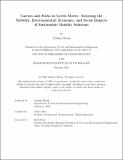Carrots and Sticks in Green Moves: Assessing the Mobility, Environmental, Economic, and Social Impacts of Sustainable Mobility Solutions
Author(s)
Zheng, Yunhan
DownloadThesis PDF (153.2Mb)
Advisor
Zhao, Jinhua
Terms of use
Metadata
Show full item recordAbstract
In recent decades, urbanization presents an enduring challenge of our era, intensify-ing the complexities of travel demand management. In our contemporary landscape, these challenges are exacerbated by uncertainties arising from rapid technological innovation and unforeseen disruptions such as COVID-19. In response to these societal disruptions, various new transportation policy instruments have emerged. However, the impacts of many of these mobility solutions remain largely unexplored. This dissertation investigates the multifaceted impacts of four transportation policy instruments: congestion pricing on ride-hailing services in Chicago, car ownership restrictions in Beijing, the introduction of electric vehicle charging stations in California, and the promotion of remote work across the United States. Through these studies, we aim to illuminate the diverse effects of different types of sustainable mobility solutions on society.
The first study assesses the effects of Chicago’s Ground Transportation Tax, which is a congestion pricing policy targeting ride-hailing service in downtown Chicago. While the policy was launched aiming to discourage single ride-hailing trips and stimulate shared ride-hailing trips as a way to combat the plague of congestion and promote sustainable forms of transportation, the policy effectiveness remains unclear. This study is one of the first studies that empirically assess the impact of TNC congestion surcharge policies on urban transportation. We employ a difference-in-differences strategy to assess the policy influence on ride-hailing ridership and its implications for equity.
The second study examines Beijing’s car license plate lottery policy, implemented since January 2011 to address traffic congestion and air pollution. Despite the policy, Beijing residents can still buy and register cars in neighboring cities, potentially compromising its effectiveness. We employ a synthetic control method combined with difference-in-differences to quantify the policy leakage. Our results reveal that the leakage led to an additional 443,000 cars sold in neighboring cities (within 500 km of Beijing) from 2011-2013, constituting 35%-40% of the stipulated car growth reduction. Acknowledging this leakage emphasizes the need for a more comprehensive, regionally collaborative approach to Beijing’s urban transportation challenges.
The third study explores the economic impact of Electric Vehicle Charging Stations
(EVCS) beyond their primary function of promoting cleaner transportation. Analyzing a dataset covering 5,000 EVCS and 130,000 Points-of-Interest (POI) in California, this study employs a combination of propensity-score-matching and difference-in-differences methods to systematically measure the influence of EVCS on nearby establishments. The findings reveal that a newly-established EVCS within 500 meters significantly increases customer visits and annual spending at nearby businesses, emphasizing the economic advantages of increased EVCS investments. We also find that EVCS benefit businesses not only in developed regions but also in disadvantaged regions, and tend to attract higher-income and exploratory visitors.
The fourth study investigates remote work, whose sustainability impact has garnered great attention amid its widespread adoption during the COVID-19 pandemic. This study examines the impacts of remote work on vehicle-miles traveled (VMT) and transit ridership in the United States from April 2020 to October 2022. Applying the instrumental variable approach, this study finds that remote work significantly reduces state-level vehicle-miles traveled and Metropolitan Statistical Area transit ridership, and also quantifies the specific effect magnitude. Based on these results, we also measure the impacts of remote work on on-road CO2 emissions and transit fare revenue loss during this period. The insights are crucial for policymakers addressing urban transport and environmental sustainability amid continued remote work trends.
Date issued
2024-02Department
Massachusetts Institute of Technology. Department of Civil and Environmental EngineeringPublisher
Massachusetts Institute of Technology